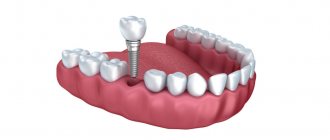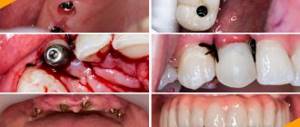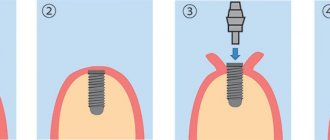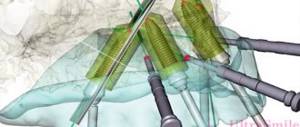Implantation is recognized as an advanced method for restoring lost teeth. This popular technique is used by dental centers all over the world. Manufacturers from different countries produce high-quality structures for implantation that restore the dentition and aesthetic qualities of a smile.
Many patients have heard about the benefits of installing implant systems, but not many know about the disadvantages of such treatment. In the article we will consider all the disadvantages of dental implants, reviews
patients and possible health risks after the procedure.
General information about the dental implant procedure
The essence of implantation is the restoration of a lost tooth or several units in a row by implanting an artificial root into the jaw bone, followed by installing a dental crown on the implanted pin.
Dental implantation takes place in several stages:
1. Examination and preparation of the patient’s oral cavity. In the presence of caries and other dental diseases, implantation is not performed. Initially, diagnostics are performed using hardware techniques, then the doctor carries out all the necessary treatment procedures to eliminate the identified diseases. If the patient has chronic diseases of various organs and systems of the body, he will also have to undergo an examination by specialized specialists, who must give an opinion on the possibility of safe dental implantation.
2. At the second stage, dental implants are implanted
. This is a surgical procedure performed under anesthesia during which the doctor implants an artificial root into the jaw bone and installs a temporary crown.
3. Several months should pass after the second stage. This time is allotted for the complete engraftment of the artificial root. If during this period the patient does not experience complications, the implantation is completed with the installation of a permanent crown. Externally, such a tooth cannot be distinguished from a real one. It also performs all chewing functions and withstands the various stresses associated with eating solid food.
Dental implants vary in shape, material and other technical parameters.
What are the types of dental implants
there are:
1. By installation method: intraosseous, extraosseous, mini-implants, cortical, basal, zygomatic.
2. By type of thread: compression, self-tapping, combined.
3. By type of material: titanium, zirconium, ceramic.
4. According to the size of the artificial root: short up to 10 mm, classic - within 20 mm, elongated - over 20 mm.
5. Shape: cylindrical, root-shaped, disk, combined, lamellar.
Before installing an artificial tooth, the patient needs to decide on the choice of implant, listening to the recommendations of the attending physician.
Today, dental implants are the most advanced method of restoring the integrity of the dentition. However, there are two sides to every phenomenon, so I would like to objectively present all the pros and cons of installing dental implants.
The presence of a large number of implantation techniques allows you to choose the one that is most suitable for the patient, and there are no restrictions on the number of implanted implants.
The durability of dental implants is one of the arguments in favor. High-quality dental implants will serve their owner for one or more decades. The maximum recorded service life of a dental implant is 40 years. By comparison, the average lifespan of traditional dentures is 3-8 years. However, we should not forget that the service life of the implant directly depends on the situation in the oral cavity, as well as on the patient’s health as a whole, because the human body is a changing system.
| Before treatment | After treatment |
The second most important fact when choosing a treatment method in favor of implantation is that in this case the neighboring teeth are not involved in any way in the prosthetic process. Installing a dental implant does not require grinding down two adjacent, quite possibly completely healthy teeth, as occurs when restoring a defect with a bridge.
Another advantage of implantation is that when an artificial tooth root is installed, the bone around it receives a natural and correct load, the same as when the patient has his own tooth root. Thanks to this, bone loss and deformation are excluded, and, consequently, bite deformities, diseases of the temporomandibular joint, and changes in the patient’s facial oval.
In addition, dental implants are indistinguishable in function from natural teeth; there is no sensation of the presence of a foreign body in the mouth. After healing and installation of a crown on a dental implant, they feel completely like your own teeth, because, in fact, the patient’s tooth root is replaced with a titanium root. Implants can withstand heavy loads. People who have dental implants have the opportunity to eat their usual food. The mucous membrane of the oral cavity and the palate are not covered with a prosthesis, so there are no changes in sensations when eating, and there are no speech defects. Implants are no different in appearance from real teeth. They look beautiful and aesthetically pleasing.
Another argument in favor is that caring for a dental implant is easier than caring for a prosthesis and is not much different from caring for your own teeth. Caring for implants is reduced to regular hygienic brushing of teeth. Professional hygiene is performed as standard, as in the case of your teeth, once every 6 months.
From a perspective perspective, the crown on an implant can always be replaced, and if the teeth adjacent to the implants are destroyed, it is possible to use previously installed structures for prosthetics. The pro argument for people who have lost all their teeth is that any type of full denture on implants fits much more securely in the mouth.
Despite all the advantages of the technique, it should be understood that the installation of implants is a surgical intervention that causes unpleasant sensations that create a load on the body at the time of its implementation and in the postoperative period. Compared to other types of prosthetics, the implantation procedure is more traumatic. The possibility of complications in the postoperative period cannot be excluded even with an ideally performed manipulation. The implantation technique requires the patient to carefully adhere to the postoperative regimen.
The main argument “against” is the lack of a complete guarantee of implant engraftment. The risk can be minimized by choosing a qualified doctor. A conscientious doctor will never persuade you to use cheap analogues of dental implants and related materials for implantation surgery. High-quality implants are made of high-quality bioinert titanium, which reduces the risk of rejection to almost zero. However, there is a factor in the individual reaction of the body, even if the operation was performed perfectly. When deciding on dental implantation, remember that no decent doctor can give a 100% guarantee. You may be one of the 1% of people whose implants do not take root for unexplained reasons.
There is a list of contraindications for dental implant surgery. Absolute contraindications: mental illness, bleeding disorders, immunopathology, systemic connective tissue diseases, tuberculosis and its complications, some diseases of the oral mucosa. Contraindications for implantation are some general somatic diseases in the stage of decompensation: diabetes mellitus, diseases of the cardiovascular system, rheumatic lesions, the period of treatment of oncological diseases. During pregnancy, implantation should also be postponed. There is an impressive list of contraindications for dental implantation, but only some of them are those that make treatment impossible. In most cases, preliminary preparation and treatment of the patient (both local and general) can successfully get rid of many contraindications or reduce their impact so much that the prospect of successful dental implantation opens up. By the way, age is not an absolute contraindication that excludes dental implantation; it can only limit the use of one or another type of implantation.
Often the bone volume is not enough for immediate installation of an implant, so bone grafting surgery has to be performed. The operation itself is painless and occurs quite quickly, however, this is an additional intervention that delays the patient in time from obtaining the desired smile and requires additional financial costs. Timing is generally not a strong point of the implantation technique, because... The duration of the process of “fusion” of the implant with bone tissue is 3-8 months.
Dental implantation is more expensive than classic prosthetics. But with prosthetics, the costs are higher than with implantation. Considering the fact that a prosthesis lasts an average of five years, the cost of prosthetics will constantly increase.
Implants are not eternal structures, like all natural things. Manufacturers promise the implant a long lifespan, but the installation technique and proper care play a big role. Many dental clinics often keep silent about the fact that the implant manufacturer gives a lifetime guarantee for the dental implant itself, and not for its installation. Therefore, before surgery, always check not the service life of the implant itself, but the warranty period for its installation.
What are the contraindications to the procedure?
Not every patient can have dental implants, due to a number of contraindications.
Contraindications to implantation:
- diabetes mellitus type II;
- cardiovascular pathologies;
- AIDS, HIV;
- hepatitis;
- open tuberculosis;
- bruxism;
- malocclusion;
- inflammatory diseases of the oral cavity;
- poor blood clotting;
- low immunity;
- mental illness;
- oncology;
- venereal diseases;
- allergic reactions.
Implantation is not performed during pregnancy, lactation, during exacerbation of chronic diseases, or in patients under 20 years of age.
Rehabilitation period
After installation of the artificial root, a rehabilitation period begins, which is quite painful for the patient.
Symptoms that occur during the rehabilitation period:
- severe pain in the oral cavity;
- swelling and hyperemia of the gums;
- bleeding from gum tissue;
- increase in body temperature.
If the outcome is favorable, all of the above symptoms disappear a few days after the procedure. If relief does not occur, the pain intensifies, purulent discharge or other unfavorable symptoms appear, the patient needs to urgently visit the attending physician, as these signs indicate the addition of a bacterial infection.
What not to do after implantation?
After installation of a dental implant, the patient must responsibly follow all prescriptions and recommendations of the treating dentist.
Basic rules and prohibitions:
1. To avoid the development of infections in the oral cavity during the postoperative period, the patient needs to carefully care for the oral cavity, take medications as prescribed, avoid alcohol intake, and consume warm soft foods and drinks.
2. Avoid any physical activity for a week after implantation.
3. The dental implant must not be subjected to mechanical stress.
4. For some time after the procedure, you cannot visit the bathhouse or sauna; the patient must avoid overheating and hypothermia.
5. If the first signs of complications or implant rejection appear, immediately consult a doctor.
Differences between implantation methods
In the human jaw, bone tissue is heterogeneous and differs significantly in its density:
- The top layer consists of spongy bone. It has a porous structure and is therefore most susceptible to atrophy, mainly in those areas where teeth are missing. It is in this bone layer that classic implants are installed, provided there is sufficient volume.
- Below are the denser layers of the jawbone. One of them is cortical, has high strength and density, but its thickness is insignificant. The second is the basal, deepest layer, which, even in the complete and long-term absence of elements of the dentition, is not subject to atrophy. Special implants with
wide thread diameter.
Thanks to basal implantation, the possibility of dental prosthetics has become possible even in cases where increasing the volume of bone tissue and corresponding surgical actions can only bring negative consequences. Therefore, you should carefully consider the advice of dentists before basal prosthetics.
Is it possible to do MRI diagnostics if you have a dental implant?
Many patients have the following question: is it possible to have an MRI with a dental implant?
? Dental implantation is not a contraindication to MRI diagnostics. Some structures made of non-inert metals may distort the results of the study.
In order for the diagnostician to correctly set up the MRI machine, the patient must show documents (special passport) received at the dental center, which will contain all the information about the installed dental implant.
Advantages of zirconium crowns
The main advantages of crowns made from zirconium dioxide are:
- excellent aesthetic properties (a high-quality prosthesis cannot be distinguished from a natural dental crown);
- excellent biological compatibility (zirconium oxide is a natural, hypoallergenic material that is significantly superior to any alloys and ceramics in terms of biocompatibility);
- no need for deep grinding of teeth during prosthetics;
- low risk of deformation of prosthetic devices during use;
- high service life of crowns (with proper use and proper care - 15 years or more);
- inertness of the material (when zirconium dioxide enters the oral cavity, it does not enter into chemical reactions and does not change its physical properties).
Dental implantation at Aesthetics dentistry
Despite the disadvantages of implantation, this method of restoring lost units is still considered the best and most effective. The dental clinic employs highly qualified doctors who perform high-quality dental implantation with minimal risks of complications. This is confirmed by positive patient reviews.
The specialist conducts a competent examination of the patient’s oral cavity, studies personal history, and only then makes a decision on possible dental implantation, without adverse consequences for the patient.
The center uses high quality implants from the world's best manufacturers. All patients who leave reviews on the site are given a 3% discount on dental implantation and other dental procedures. The first consultation examination is free!










